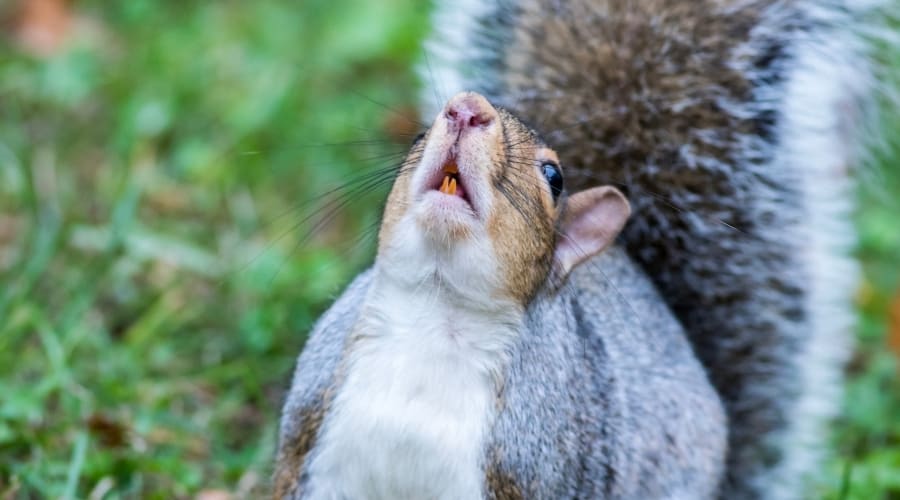Are squirrels’ teeth sharp? It’s a reasonable question considering how long squirrel’s teeth are. Did you know that a squirrel’s teeth can grow as long as three to six inches?
Watching them open nuts offers a few clues to the power behind their jaws, but the question remains about whether their teeth are blunt or razor-sharp.
Squirrels have very sharp teeth. They rely on their teeth for self-defense as well as for cracking nuts and seeds open to get to the nutritious meats inside the hard shells. Their teeth are sharp enough to pierce through the skin of vegetables and fruits and animals with ease.
In this article I’m going to share my experiences with a squirrel I found in the backyard and attempted to domesticate.
Continue reading for a first-hand account that will describe the sharpness of squirrel teeth and why you need to know just exactly how sharp squirrel teeth are, and what can happen when they bite you.
Table of Contents
How Sharp Are Squirrels Teeth
I found a wounded squirrel under a tree in the corner of my backyard. He seemed helpless and vulnerable. I didn’t realize that I was taking a big risk by offering help.
He couldn’t run fast so I easily caught him and picked him up. When the squirrel tried to run, I tightened my grip and he responded the way any wild animal would in a life-threatening situation.
I felt his teeth sink deep into the palm and upper part of my hand. I can attest that squirrels have extremely sharp teeth because of the speed at which his teeth sliced through my flesh.
It left deep wounds that required emergency medical treatment and a few rounds of antibiotics. It was a painful wound that took several weeks to heal.
It would have otherwise required stitches but because of the deep punctures, steri-strips were used to hold the flesh in place as stitches were not the best option due to the risk of infection.
They wanted the wound to heal from the inside out.
Do Squirrels Sharpen Their Teeth
Squirrels constantly sharpen their teeth. Since their teeth never stop growing, they must constantly chew and gnaw to prevent the teeth from growing too long.
This instinctual habit causes the teeth to become very sharp. Squirrels have been known to file their teeth down and sharpen them in several ways.
They gnaw on mortar, asphalt, the siding of houses, pieces of wood, metals sheetrock, and other items they find. Their strong jaws give them the ability to chew on things that would break a human’s teeth.
If a squirrel has nothing else to chew or gnaw on, they will grind their teeth together and sharpen them against one another. It’s natural for the teeth to become sharp from all of the activity.
What Kind Of Teeth Does Squirrel Have
Squirrels have long and sharp teeth that are exceptionally strong. Nature has equipped them with strong teeth that are sharp to help defend themselves against predators and to eat seeds and nuts more easily.
Squirrel teeth tend to be blunt, but they are also sharp to go along with their bluntness. This helps them to more easily crack through hard shells to get to the food inside.
Their teeth grow to lengths between three and six inches when squirrels reach maturity. Squirrels have four large incisors that make them ideal for chewing foods that would otherwise be difficult or impossible to eat with only regular molars.
On top of the four incisors, squirrels have 8 molars that are used to grind their food up to a small enough size to swallow them.
Do Squirrels Have Canine Teeth
The answer to this question is no, squirrels do not have canine teeth. When you examine the teeth of a squirrel you will see that there is a gap that exists between their molars and incisors.
This is nature’s design for making it easier for them to use their super-sharp incisors to gnaw and slice or crack hard foods open.
The incisors are sharper than most canine teeth in other animals or humans and the gap makes it easy for them to roll foods around in their mouths to the ideal positioning.
Squirrel Teeth Growth
Squirrels are rodents with unique dental growth patterns. Squirrel teeth never stop growing. It is because of the constant growth that they are naturally inclined to chew.
The chewing helps to keep the teeth honed to a reasonable length which in some varieties still reaches up to 6 inches long.
The chewing also sharpens their teeth and keeps them conditioned. When you combine these factors, it’s no small wonder that squirrels have a habit of biting and chewing.
Baby Squirrel Teeth
When squirrels are born, they do not have teeth. They do not develop teeth, or at least, their teeth do not emerge through the skin until they are approximately three weeks of age.
The first teeth to come through are their lower incisors. These are followed by the upper incisors which erupt through the skin when a baby squirrel is about four and a half weeks old.
From the time that the teeth emerge through the skin of the gums, they continue to grow throughout the entire lifespan of the squirrel.
Do Squirrels Have Fangs
In general, squirrel teeth are not generally fanglike, but some squirrels do develop fangs. It happens when the front incisors of the squirrel sustain damage or become uneven.
In these instances, it is the instinct of the squirrel to work frantically to grind the teeth down to make them even. This can result in the development of very large and dangerous fangs.
Squirrel Teeth Facts
Squirrel teeth is a fascinating subject. These rodents have some of the most unique teeth in the animal kingdom.
Here are some interesting facts about squirrel teeth that are good to know if you live around them or have a pet squirrel in your home.
1-Squirrel Teeth Are Razor-Sharp
Squirrel teeth are extremely sharp because they file and hone them regularly. The constant chewing activities cause their teeth to develop sharp edges that make them good for eating foods with hard shells.
2-Squirrel Teeth Never Stop Growing
Squirrels do not develop teeth until they are three weeks old. They continue to grow 4 incisors and 8 molars. A squirrel’s incisors never stop growing. This is why they are obliged to keep them honed down.
3-Squirrel Teeth Require Constant Maintenance
It’s a squirrel’s nature to bite, chew and gnaw. Their teeth require constant maintenance to prevent them from growing so long that they would be useless for eating food or for defending themselves.
Squirrels have no choice but to constantly gnaw on materials that are harder than the enamel of their teeth to keep the growth in check.
Squirrel teeth can grow to between three and six inches in length.
4-Squirrel Teeth Are Their Primary Tools For Survival
Squirrels depend on their teeth for their very survival. They use their ultra-sharp teeth to ward off predators by biting them and discouraging attacks.
They also depend on their teeth to slice through fruits and vegetables or animal skin, as well as for cracking seeds and nuts open to get to the nutritious food that is within the shells.
They can crack a walnut with lightning speed because of the strength and sharpness of their teeth.
5-Squirrels Bite
Some domestic squirrels may be friendly, but even those which are domesticated tend to bite humans and other animals. It’s in a squirrel’s nature to bite. It’s a natural response that cannot be completely conditioned out of them.
Final Thoughts
Are squirrels’ teeth sharp? It’s been my personal experience that yes, they are very sharp. Having been bitten by a squirrel and suffering the consequences of my lack of respect for just how sharp their teeth are, I caution anyone with a squirrel to be mindful of the fact that squirrels are wild animals with an inborn tendency to bite at the first sign of danger or distress.
Their teeth continue to grow for the duration of their lives. This makes it necessary for squirrels to constantly gnaw or chew on something harder than the enamel of their teeth.
They must chew to prevent their teeth from growing so long that they are not useable for protection or for accessing foods sources.
Squirrels have teeth so sharp that in mere seconds, they can cause a great deal of physical damage to a human’s hand or other body parts, as well as chewing up the things that they find in your home.
They are indiscriminate gnawers who will chew anything that they can get their paws on. They can’t help it. I’m sharing my story with you to help you to avoid suffering the same consequences as me.
Squirrel bites can be serious and can lead to infection. Squirrels with 6-inch fangs may even be considered dangerous, so never discount the sharpness of a squirrel’s teeth or the harm they can cause.

